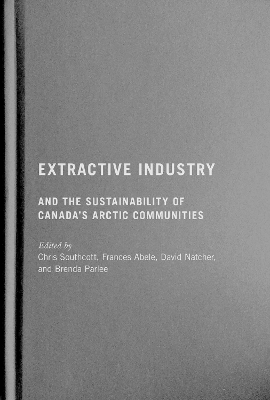
Extractive Industry and the Sustainability of Canada's Arctic Communities
2022
McGill-Queen's University Press (Verlag)
978-0-2280-1154-5 (ISBN)
McGill-Queen's University Press (Verlag)
978-0-2280-1154-5 (ISBN)
- Titel z.Zt. nicht lieferbar
- Versandkostenfrei
- Auch auf Rechnung
- Artikel merken
This collection delves into the final research findings of the SSHRC-sponsored MCRI project “Resources and Sustainable Development in the Arctic,” which attempted to determine what was required for extractive industry to benefit northern communities, and advocates for a more authentic participation from the Indigenous peoples of Canada’s Arctic.
Modern treaties, increased self-government, new environmental assessment rules, co-management bodies, and increased recognition and respect of Indigenous rights make it possible for northern communities to exert some control over extractive industries. Whether these industries can increase the well-being and sustainability of Canada’s Arctic communities, however, is still open to question.
Extractive Industry and the Sustainability of Canada’s Arctic Communities delves into the final research findings of the Resources and Sustainable Development in the Arctic project which attempted to determine what was required for extractive industry to benefit northern communities. Drawing on case studies, this book explores how northern communities can capture and distribute a fairer share of financial benefits, how they can use extractive activities for business development, the problems and possibilities of employment and training opportunities, and the impacts on gender relations. It also considers fly-in fly-out work patterns, subsistence activities, housing, post-mine clean-up activities, waste management, and ways of monitoring positive and negative impacts. While extractive industries could potentially help improve the sustainability of Canada’s Arctic, many issues stand in the way, most notably power imbalances that limit the ability of Indigenous Peoples to equitably participate in their governance.
Extractive Industry and the Sustainability of Canada’s Arctic Communities emphasizes the general need to determine how new institutions and processes, which are largely imported from the south, can be adapted to allow for a more authentic participation from the Indigenous Peoples of Canada’s Arctic.
Modern treaties, increased self-government, new environmental assessment rules, co-management bodies, and increased recognition and respect of Indigenous rights make it possible for northern communities to exert some control over extractive industries. Whether these industries can increase the well-being and sustainability of Canada’s Arctic communities, however, is still open to question.
Extractive Industry and the Sustainability of Canada’s Arctic Communities delves into the final research findings of the Resources and Sustainable Development in the Arctic project which attempted to determine what was required for extractive industry to benefit northern communities. Drawing on case studies, this book explores how northern communities can capture and distribute a fairer share of financial benefits, how they can use extractive activities for business development, the problems and possibilities of employment and training opportunities, and the impacts on gender relations. It also considers fly-in fly-out work patterns, subsistence activities, housing, post-mine clean-up activities, waste management, and ways of monitoring positive and negative impacts. While extractive industries could potentially help improve the sustainability of Canada’s Arctic, many issues stand in the way, most notably power imbalances that limit the ability of Indigenous Peoples to equitably participate in their governance.
Extractive Industry and the Sustainability of Canada’s Arctic Communities emphasizes the general need to determine how new institutions and processes, which are largely imported from the south, can be adapted to allow for a more authentic participation from the Indigenous Peoples of Canada’s Arctic.
Chris Southcott is professor of sociology at Lakehead University. Frances Abele is Chancellor’s Professor, School of Public Policy and Administration at Carleton University. Dave Natcher is professor in the Department of Agricultural and Resource Economics at the University of Saskatchewan. Brenda Parlee is professor in the Department of Resource Economics and Environmental Sociology at the University of Alberta.
| Erscheinungsdatum | 26.08.2022 |
|---|---|
| Zusatzinfo | 35 photos, 11 tables |
| Verlagsort | Montreal |
| Sprache | englisch |
| Maße | 152 x 229 mm |
| Themenwelt | Naturwissenschaften ► Biologie ► Ökologie / Naturschutz |
| Naturwissenschaften ► Geowissenschaften ► Geografie / Kartografie | |
| Sozialwissenschaften ► Pädagogik ► Sozialpädagogik | |
| Sozialwissenschaften ► Politik / Verwaltung ► Staat / Verwaltung | |
| Sozialwissenschaften ► Soziologie | |
| ISBN-10 | 0-2280-1154-X / 022801154X |
| ISBN-13 | 978-0-2280-1154-5 / 9780228011545 |
| Zustand | Neuware |
| Haben Sie eine Frage zum Produkt? |
Mehr entdecken
aus dem Bereich
aus dem Bereich


